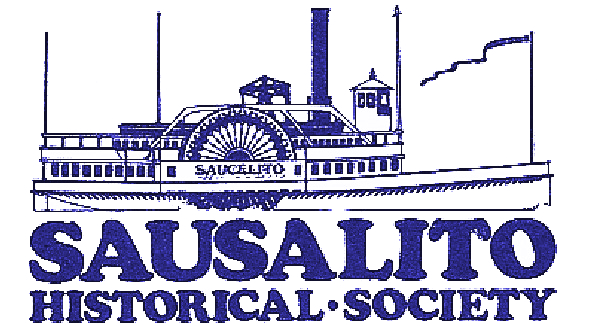By A.B. Sidebotham and Larry Clinton, Sausalito Historical SocietyAlfred Bryce Sidebotham was the pastor of the local Presbyterian church when he wrote this guest editorial for the Sausalito News on November 13, 1941:
After enlisting, Reverend Sidebotham posed with his wife and daughter in front of the Sausalito Presbyterian Church.
PHOTO COURTESY OF SAUSALITO HISTORICAL SOCIETY
Most of us think that the custom of observing a day of Thanksgiving is strictly an American movement. However, such a day is much older than the known history of our new world. We find in searching the records that Egypt had periods of thanksgiving to their gods centuries ago. The same thing is true of the ancient Greeks and Romans. As we read the Holy Scriptures of the Jews, we find that they had many days of thanksgiving to God for his mercies and kindnesses. Since those early times, people have often set aside days of thanksgiving. European history is full of days set aside for such a purpose. One day stands out for its probable effect upon our land. October 3 was set aside by the Hollanders as a special day of thanks to commemorate the time in 1575 when the Spaniards lifted the siege of Leyden. As every school boy knows, our New England ancestors spent some time in Holland before forming a company to charter a boat and set sail for the new world in 1620. In our own land, three days stand out as great Thanksgiving Days in our history. The first was in 1621, when our New England ancestors after a year of extreme difficulties and hardships, were desirous of thanking God. The second great day was November 26, 1789 when our first President proclaimed the first national Thanksgiving Day. Such days were celebrated often after that, but it was not until another great day came that the idea became an institution in our national life. In 1863, another President called for a day of Thanksgiving. Lincoln called for this day even though there were many northern and southern men who would never return to their homes. He proclaimed such a day even though many of the men who did return home would be invalids the rest of their days. It was right after his famous Gettysburg address in which he proclaimed: “It is altogether fitting and proper that we do this,” in reference to the dedication of the battlefield. In his Thanksgiving proclamation he wrote: “It has seemed to me fit and proper” to do this. Every year since “It has seemed fit and proper” to our Presidents to continue the custom. As we look at this year’s Thanksgiving, we find the world to be once more laying waste its cities and slaughtering its manpower. Can we thank God? Yes, we most certainly can—for an awakened conscience which decries this needless sacrifice of innocent men, women and children; for a conscience that says that there shall be no difference between Jew and Gentile, rich and poor, learned and unlearned, those of high or low estate . . . that the rights of our civilization shall be open to all; for a conscience that says that no amount of material goods shall be worth as much as one single human being. Yes, we can thank God that we are awakened to feel that the present day barbarities and barbarians who lust for power must be curbed. Of course, contrition for our own part in the world's wrongs is a part of our mood at this time as must also be a determination to dedicate ourselves to the sacrifices necessary to keep our world from again reaching its present state of gross immorality.
Less than three weeks after this essay was published, the attack on Pearl Harbor plunged the U.S. into the very barbarities the pastor alluded to. In 1943, Reverend Sidebotham joined the army and became a chaplain.

